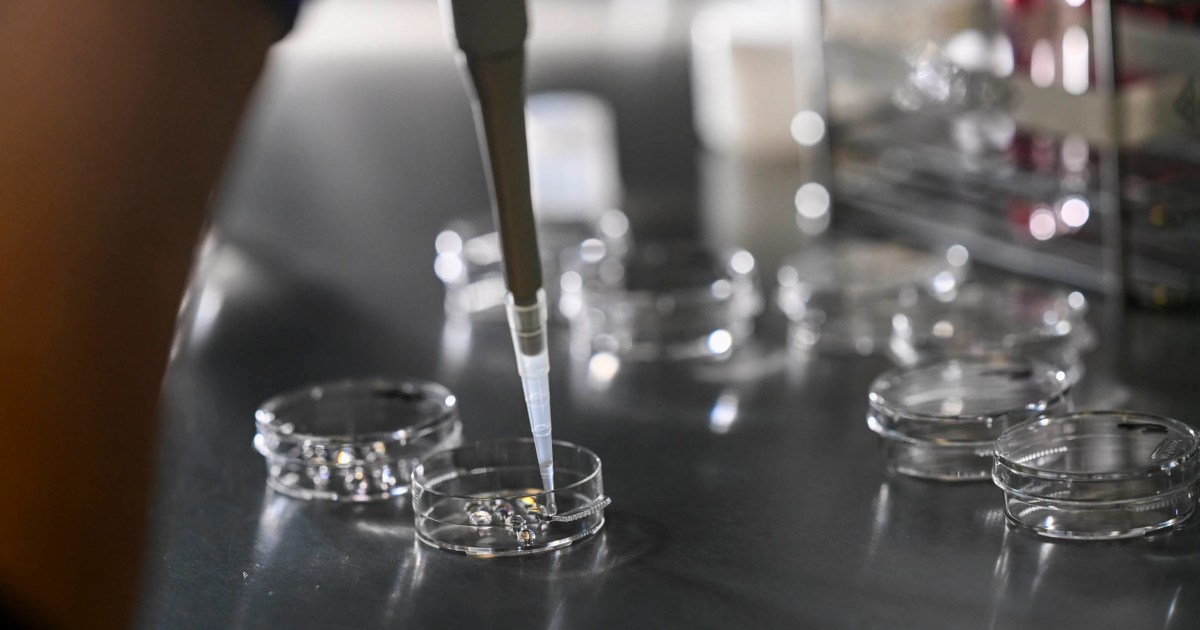
After Alabama’s state Supreme Court ruling on IVF, doctors are warning that women using in vitro fertilization and their babies could face major health risks — and young cancer patients could lose the chance to build a future family — if fertility clinics stop using frozen embryos.
“That is a possible reality,” said Dr. Irene Dimitriadis, a reproductive endocrinologist and infertility specialist at the Mass General Fertility Center in Boston. “It hurts me to think of it because that means we’re kind of going backwards in medicine.”
The court ruled last week that embryos created by IVF are considered children, sparking concerns that embryos that are destroyed or damaged could lead to civil liability. Now some Alabama fertility clinics are halting operations, leaving patients in emotional limbo, as clinics and doctors in other states brace for what they fear will be similar rulings or legislation.
Doctors say they’ve been using frozen embryos for more than 15 years because it’s the safest method for women trying to conceive through IVF.
“The reason we are freezing embryos is to help ensure the health of the woman and the pregnancy and for the babies,” said Dr. Zev Williams, a fertility expert at Columbia University Fertility Center. “There are many cases where it is healthier for the pregnancy, the future child and for the mother to have embryos frozen.”
Freezing embryos for IVF became standard practice after the development of vitrification, a fast-freezing process that is safer for the embryo. While there’s still a risk of damage during the thawing process, doctors say there are fewer complications than the only other option, using fresh embryos.
About 2% of babies are conceived using assisted-reproductive technology in the U.S., according to data from the Centers for Disease Control and Prevention. Some studies suggest using frozen embryos have better success rates, but doctors say the evidence isn’t conclusive.
One big benefit to freezing embryos is that it allows doctors to transfer one embryo at a time to the uterus. Before freezing technology was improved, often many embryos were transferred at once in the hope that at least one would implant and develop into a pregnancy. However, that increased the risk of triplets, quadruplets or more in some cases.
“Most people in that situation will either deliver prematurely, or those fetuses don’t survive because the uterus is not meant to hold multiple babies,” said Dr. Emily Jungheim, chief of reproductive endocrinology and infertility at Northwestern Medicine. “Higher-order multiples are always going to lead to time in the neonatal intensive care unit.”
Multiple babies born prematurely face serious risks like blindness, damage to the bowels and other long-term disabilities, Jungheim said. Mothers pregnant with multiples usually need to have a cesarean section.
“Putting that kind of stress on the body of the mother, we’re just learning about what that can do later in life to her,” she added.
Doctors say freezing embryos also gives a woman’s body time to recover before an embryo is implanted. IVF cycles involve taking medications and hormones to stimulate egg production, which takes a toll on the body.
“When going through an IVF cycle, the lining of the uterus sees higher levels of estrogen, which creates a nontypical environment,” Williams said. “If you put the embryos back in that environment, there’s a higher risk of complications. It’s better not to transfer right away. It’s better for there to be a new, healthier lining.”
Medications used for IVF also put women at risk for ovarian hyperstimulation syndrome, a condition that causes the ovaries to swell and become painful. Getting pregnant with this condition is dangerous and can cause blood clots, pulmonary embolisms, even death, said Dimitriadis.
“If I can freeze embryos instead and have her come back later, it’s safer,” Jungheim said.
Protecting fertility after cancer treatment
For young female cancer patients, losing their fertility because of chemotherapy can be as devastating as the cancer diagnosis itself. Having the option to freeze embryos can be the only bright spot during one of the toughest times of their life, doctors say.
“If a woman has cancer and has to go through treatment, that can obliterate her eggs,” Williams said. “If she undergoes IVF and freezes embryos, once she recovers, she has embryos stored to help her build a family.”
Without frozen embryos, doctors say they’ll be unable to screen and diagnose for serious and sometimes fatal genetic conditions like cystic fibrosis or sickle cell disease, which are passed on to children from parents with genetic mutations. Right now, if parents are known carriers, doctors can do small biopsies on the embryos to determine which ones are healthy.
“But in order to do that, we need to be able to freeze the embryo after we biopsy it,” Dimitriadis said. “If we don’t freeze the embryo after we biopsy it, we don’t have time to get the results back from that test.”
Dimitriadis said similar tests can be used for women who have recurrent miscarriages to figure out the cause of those issues and make sure they’re only implanting the healthiest embryos.
“You can imagine the struggles they go through,” she said. “This can save them a lot of the angst and despair that they feel.”






